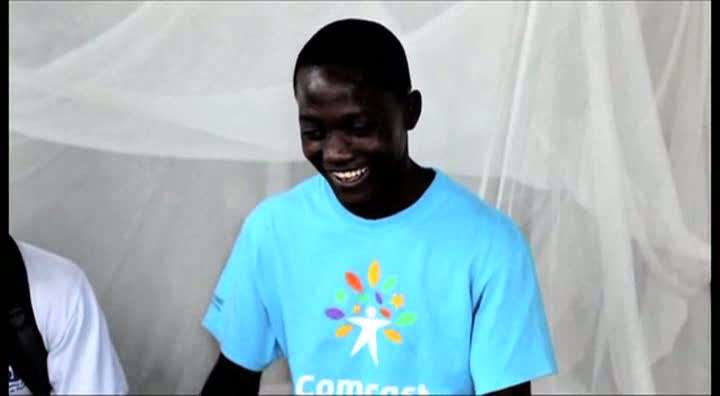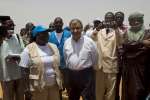- Text size
 |
|  |
|  |
| 
- Français
UNHCR chief focuses on documentation programme during Haiti visit
News Stories, 9 September 2011
PORT-AU-PRINCE, Haiti, September 9 (UNHCR) – UN High Commissioner for Refugees António Guterres visited Haiti this week, putting the spotlight on a project that is helping Haitians who lost vital documentation needed to rebuild their lives after the devastating earthquake of January 2010.
During his visit on Wednesday and Thursday, Guterres also toured other UNHCR programmes and met government officials to discuss the need to provide assistance to the undocumented Haitians who lost everything in the earthquake, which destroyed much of the capital, Port-au-Prince, and left tens of thousands dead.
Some 20 months after the earthquake struck, there are still more than 600,000 people living in about 1,000 spontaneous camps around Port-au-Prince and roughly 200,000 internally displaced people staying with host families in cramped makeshift housing.
Many of these people lost vital documents, including birth certificates. Moreover, because only about a quarter of Haitians are born in hospitals, many births go undocumented. These two factors have left a large portion of the population without proof of their identity, which can affect their ability to rebuild their lives.
''Providing a birth certificate helps Haitian citizens access their fundamental human right – proof of nationality. Without birth certificates, these people don't exist," Guterres said in Port-au-Prince. The High Commissioner appealed to the Haitian authorities to undertake legislative reforms to ensure that those without documentation can get birth certificates easily and for free.
Jackson Emile, 17, is one of the many who would benefit. His family is from the seaside town of Leogane, which lies above the epicentre of the earthquake. Jackson lost his home, his father and the only proof he had of his identity. Without a birth certificate, Jackson has had a difficult time claiming ownership of his family's land.
"Before the earthquake I used to live very well. My dad was here with me. I used to eat well. Everything was okay." Following his father's death last year, Jackson was unable to finish school and had to fight people who were trying to take his land.
Supporting Haitians in obtaining official documentation is one of UNHCR's primary objectives in Haiti and a key tool in preventing statelessness. To achieve this goal, UNHCR has partnered with local NGOs and Haitian administrators. They spearheaded projects in Leogane, Carrefour and Port-au-Prince as well as in the border area with the Dominican Republic, which shares the island of Hispaniola with Haiti.
Guterres promised that UNHCR would continue to develop documentation programmes and assist the government in modernizing its civil registry system. Documentation acts as a source of protection for individuals. Without a birth certificate people can not enjoy their most basic rights, including land ownership and access to education and health care. It also makes them vulnerable to exploitation and trafficking.
By the end of this year, the UNHCR projects will have provided recognized birth certificates, free of charge, to 5,000 vulnerable people in Leogane and other parts of Haiti. These documents will help them get access to public services and protect them from abuse and exploitation. They will also help in family tracing and reunification.
For Jackson, receiving a copy of his birth certificate is the first step towards rebuilding his life. "When I turn 18, I would like to be able to have full control of my land. I plan on farming the land – growing rice – giving back to the community of Leogane," he said.
The High Commissioner's focus during his Caribbean trip this week has been on refugee issues and the prevention of statelessness in the Dominican Republic and Haiti, reinforcing a global UNHCR campaign on the 50th anniversary of the Convention on the Reduction of Statelessness.






































